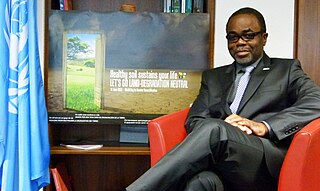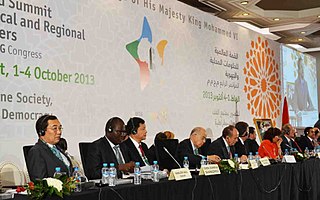This article needs to be updated.(September 2015) |

The South American Energy Council is a body set up to co-ordinate the regional energy policy of the Union of South American Nations (UNASUR). [1]
This article needs to be updated.(September 2015) |

The South American Energy Council is a body set up to co-ordinate the regional energy policy of the Union of South American Nations (UNASUR). [1]
Its establishment was agreed at the first South American Energy Summit, which took place on April 16–17 2007 on Isla Margarita in the Venezuelan state of Nueva Esparta. [2] It was officially created in May 2010 during the UNASUR's Extraordinary Summit in Los Cardales, Argentina. [3]
In 2012, the Council started to draft a South American Energy Treaty. Before drafting this treaty, the Council coordinated the creation of an energy balance and a 15-point strategy. [3]

World Agroforestry is an international institute headquartered in Nairobi, Kenya, and founded in 1978 as "International Council for Research in Agroforestry". The centre specializes in the sustainable management, protection and regulation of tropical rainforest and natural reserves. It is one of 15 agricultural research centres which makes up the global network known as the CGIAR.
The International Disability Alliance (IDA), created in 1999, is an umbrella organization focused on improving awareness and rights for individuals with disabilities around the globe. The IDA works with Non Governmental Organizations (NGO's), supranational organizations such as the United Nations (UN), as well as state governments in order to create legislation, fund disability programs in developing and industrialized countries, and advocate for people with disabilities around the world. The IDA works very closely with the United Nations, and in particular they use the United Nations Convention on the Rights of Persons with Disabilities (UNCRPD) as their code of conduct.

The South American Energy Summit is the name for one of a sequence of summits bringing together delegations from the countries of the Union of South American Nations to discuss energy related issues.

Luc-Marie Constant Gnacadja or simply Luc Gnacadja is a Beninese politician and architect. He was Executive Secretary of the United Nations Convention to Combat Desertification from 2007 to 2013.

United Cities and Local Governments (UCLG) is an umbrella international organisation for cities, local and regional governments, and municipal associations throughout the world that is concerned with representing and defending the interests of local governments on the world stage.
The UNASUR Constitutive Treaty, officially the Constitutive Treaty of the Union of South American Nations, was signed on May 23, 2008 during the extraordinary summit of heads of state and government of the Union of South American Nations (UNASUR) held in Brasília, Brazil. It officially established the Union of South American Nations, an intergovernmental continental union of all twelve South American nations.

The South American Parliament is a proposed body of the Union of South American Nations (USAN).

The 2010 South American summit, took place in Georgetown, Guyana on November 26, 2010. Eight heads of state and four foreign ministers of the Union of South American Nations attended the summit. During the summit, the leaders signed an additional protocol to the Constitutive Treaty, adding a democratic clause to the charter of the organization. The Georgetown summit ended with the Ecuadorian president handing the UNASUR pro-tempore presidency for the next twelve months to his Guyanese counterpart, Bharrat Jagdeo.

The International Institute for Sustainable Development (IISD) is an independent think tank founded in 1990 working to shape and inform international policy on sustainable development governance. The institute has three offices in Canada - Winnipeg, Ottawa, and Toronto, and one office in Geneva, Switzerland. It has over 150 staff and associates working in over 30 countries.

The Sustainable Development Goals or Global Goals are a collection of seventeen interlinked objectives designed to serve as a "shared blueprint for peace and prosperity for people and the planet, now and into the future." The SDGs are no poverty; zero hunger; good health and well-being; quality education; gender equality; clean water and sanitation; affordable and clean energy; decent work and economic growth; industry, innovation and infrastructure; reduced inequalities; sustainable cities and communities; responsible consumption and production; climate action; life below water; life on land; peace, justice, and strong institutions; and partnerships for the goals. The SDGs emphasize the interconnected environmental, social and economic aspects of sustainable development by putting sustainability at their center.

The International Renewable Energy Agency (IRENA) is an intergovernmental organization mandated to facilitate cooperation, advance knowledge, and promote the adoption and sustainable use of renewable energy. It is the first international organisation to focus exclusively on renewable energy, addressing needs in both industrialised and developing countries. It was founded in 2009 and its statute entered into force on 8 July 2010. The agency is headquartered in Masdar City, Abu Dhabi. The Director-General of IRENA is Francesco La Camera, a national of Italy. IRENA is an official United Nations observer.

Patrick Epaphra Ngowi is a Tanzanian entrepreneur, businessperson, environmentalist, Al Gore's climate change reality leader and United Nation's SDG 7 Pioneer. Patrick has founded and led several businesses over the course of his career.

The Global Center on Adaptation (GCA) was founded on 18 September 2018. Hosted by the Netherlands, GCA engages in policy activities, research, communications, and technical assistance to government and the private sector, policy development, research, advocacy, communications, and partnerships. GCA's floating headquarters is hosted by the Netherlands in Rotterdam, with regional offices in Africa, South Asia, and Asia Pacific.
The Program on Forests (PROFOR) was a multi-donor trust fund for forests and poverty reduction administered by the World Bank. It began at the United Nations Development Programme in 1997 and moved to the World Bank in 2002. It closed in June 2020, replaced by a new trust fund with a landscape focus, PROGREEN.
Adnan Z. Amin is a Kenyan diplomat and a development economist with a specialty in sustainable development. He served as the first Director-General of the Abu Dhabi-based intergovernmental organisation, the International Renewable Energy Agency (IRENA). Amin was elected in April 2011, having previously served as the Agency's Interim Director-General in 2010. Prior to his appointment at the IRENA, he worked in a variety of senior positions within the United Nations system in areas relating to in renewable energy, sustainable development and environmental policy. He served as the Director of the New York Office of United Nations Environment Programme (UNEP) and Special Representative of the UNEP Executive Director.
The Global Pact for the Environment project was launched in 2017 by a network of experts known as the "International Group of Experts for the Pact" (IGEP). The group is made up of more than a hundred legal experts in environmental law and is chaired by former COP21 President Laurent Fabius.

Global Goals Week is a shared commitment between a coalition of over 160 partners across all industries, which mobilizes annually in September to bring together communities, demand urgency, and supercharge solutions for the Sustainable Development Goals (SDGs). It was founded in 2016 by the United Nations Foundation, Project Everyone, and the United Nations Development Programme (UNDP). It is timed to coincide with the UN General Assembly "High-Level Week" in New York. The week includes events, summits, conferences, forums, workshops, pledges, and other activations in New York, around the world, and online. It usually runs alongside Climate Week NYC, the annual conference of Goalkeepers, Bloomberg Global Business Forum and many other high-level events.
Sustainable Development Goals and Lebanon explains major contributions launched in Lebanon towards the advancement of the Sustainable Development Goals SDGs and the 2030 agenda.
Bruno Rodriguez is an Argentine climate activist. He is leader of the Fridays for Future Movement in Argentina.